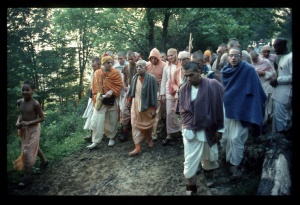CC Adi 17.230 (1975): Difference between revisions
(Vanibot #0027: CCMirror - Mirror CC's 1996 edition to form a basis for 1975) |
(Vanibot #0020: VersionCompareLinker - added a link to the Version Compare feature) |
||
| Line 2: | Line 2: | ||
<div style="float:left">'''[[Sri Caitanya-caritamrta (1975)|Śrī Caitanya-caritāmṛta (1975)]] - [[CC Adi (1975)|Ādi-līlā]] - [[CC Adi 17 (1975)|Chapter 17: The Pastimes of Lord Caitanya Mahāprabhu in His Youth]]'''</div> | <div style="float:left">'''[[Sri Caitanya-caritamrta (1975)|Śrī Caitanya-caritāmṛta (1975)]] - [[CC Adi (1975)|Ādi-līlā]] - [[CC Adi 17 (1975)|Chapter 17: The Pastimes of Lord Caitanya Mahāprabhu in His Youth]]'''</div> | ||
<div style="float:right">[[File:Go-previous.png|link=CC Adi 17.229 (1975)|Ādi-līlā 17.229]] '''[[CC Adi 17.229 (1975)|Ādi-līlā 17.229]] - [[CC Adi 17.231 (1975)|Ādi-līlā 17.231]]''' [[File:Go-next.png|link=CC Adi 17.231 (1975)|Ādi-līlā 17.231]]</div> | <div style="float:right">[[File:Go-previous.png|link=CC Adi 17.229 (1975)|Ādi-līlā 17.229]] '''[[CC Adi 17.229 (1975)|Ādi-līlā 17.229]] - [[CC Adi 17.231 (1975)|Ādi-līlā 17.231]]''' [[File:Go-next.png|link=CC Adi 17.231 (1975)|Ādi-līlā 17.231]]</div> | ||
{{CompareVersions|CC|Adi 17.230|CC 1975|CC 1996}} | |||
{{RandomImage}} | {{RandomImage}} | ||
==== TEXT 230 ==== | ==== TEXT 230 ==== | ||
<div class="verse"> | <div class="verse"> | ||
:tabe | :tabe ta' karilā saba bhakte vara dāna | ||
:ucchiṣṭa diyā nārāyaṇīra karila sammāna | :ucchiṣṭa diyā nārāyaṇīra karila sammāna | ||
</div> | </div> | ||
| Line 18: | Line 17: | ||
<div class="synonyms"> | <div class="synonyms"> | ||
tabe—thereafter; | tabe—thereafter; ta'-certainly; karilā—did; saba bhakte—unto all devotees; vara—benediction; dāna—charity; ucchiṣṭa—food remnants; diyā—giving; nārāyaṇīra—of Nārāyaṇī; karila—did; sammāna—respect. | ||
</div> | </div> | ||
| Line 32: | Line 31: | ||
<div class="purport"> | <div class="purport"> | ||
Nārāyaṇī was a niece of Śrīvāsa Ṭhākura, and later she became the mother of Śrīla Vṛndāvana dāsa Ṭhākura. In this connection the sahajiyās cite a malicious story that after eating the remnants of Lord | Nārāyaṇī was a niece of Śrīvāsa Ṭhākura, and later she became the mother of Śrīla Vṛndāvana dāsa Ṭhākura. In this connection the sahajiyās cite a malicious story that after eating the remnants of Lord Caitanya's food Nārāyaṇī became pregnant and gave birth to Vṛndāvana dāsa Ṭhākura. The rascal sahajiyās may manufacture such false statements, but no one should believe them because they are motivated by enmity against the Vaiṣṇavas. | ||
</div> | </div> | ||
Latest revision as of 16:19, 26 January 2020

A.C. Bhaktivedanta Swami Prabhupada
TEXT 230
- tabe ta' karilā saba bhakte vara dāna
- ucchiṣṭa diyā nārāyaṇīra karila sammāna
SYNONYMS
tabe—thereafter; ta'-certainly; karilā—did; saba bhakte—unto all devotees; vara—benediction; dāna—charity; ucchiṣṭa—food remnants; diyā—giving; nārāyaṇīra—of Nārāyaṇī; karila—did; sammāna—respect.
TRANSLATION
Thereafter the Lord charitably bestowed His benediction upon all His devotees. He gave the remnants of His food to Nārāyaṇī, showing her special respect.
PURPORT
Nārāyaṇī was a niece of Śrīvāsa Ṭhākura, and later she became the mother of Śrīla Vṛndāvana dāsa Ṭhākura. In this connection the sahajiyās cite a malicious story that after eating the remnants of Lord Caitanya's food Nārāyaṇī became pregnant and gave birth to Vṛndāvana dāsa Ṭhākura. The rascal sahajiyās may manufacture such false statements, but no one should believe them because they are motivated by enmity against the Vaiṣṇavas.